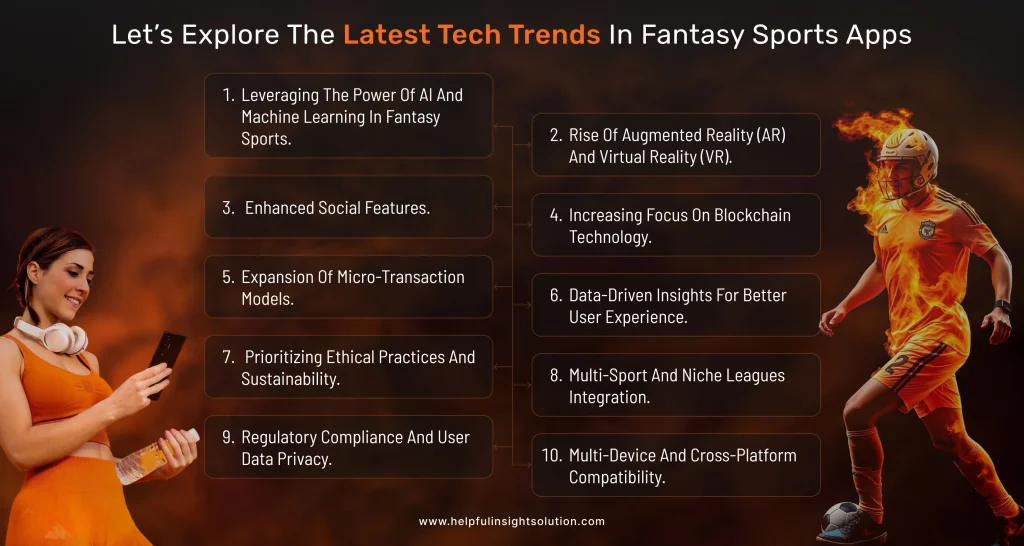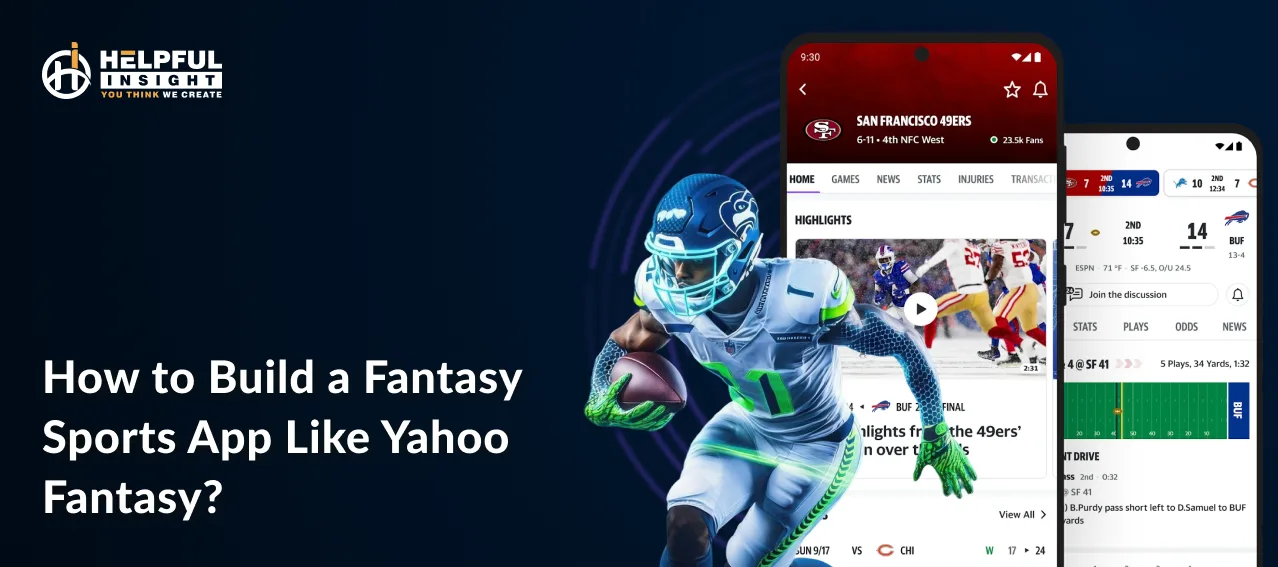The rising demand for fantasy sports app development has landed many promising opportunities for emerging entrepreneurs and large businesses. As people around the world adapted to advancing technologies, new trends in fantasy sports application development started to emerge, bringing a new angle of innovation to the industry and online sports experience.
From the integration of AR to live performance tracking of players and exciting contests, new tech trends are ready to enhance the way you play online sports. If you are a business dreaming of mobile app development with innovative and tech-advanced for the fantasy sports industry, then you’ve landed on the right page. Today, we are going to check out some of the top fantasy sports trends in 2025. These trends have high demand in the market and hold great potential to enhance the fantasy sports gaming experience on mobile platforms.
Creating Fantasy Sports Apps: Market Potential & Scope
Fantasy sports apps have experienced a rapid rise in growth and development in the last 10 years. This explosive growth comes from the increasing interest of sports fans and the general public in online sports, better technologies, and access to real-time stats. The fantasy sports app market is expected to reach $34.23 billion in 2025 at a CAGR of 11.0%. The predictions are made after noticing the increase in smartphone usage, the improvement in net connectivity, and the arrival of new gaming trends like daily fantasy sports and AI insights.
This demonstrates how much fantasy sports apps have changed a lot over the last decade. Leading fantasy sports companies like DraftKings and FanDuel, as well as new promising platforms, emphasize user involvement through gamification, live broadcasting, and personalized experiences. Additionally, by attracting both casual players and hardcore supporters, teaming up with sports leagues and franchises has empowered the ecosystem. With the growth of the fantasy sports market, even greater growth and innovations are anticipated in 2025.
Fantasy Sports App Trends: How Startups Can Capitalize By Leveraging Them
To get a competitive edge in the app market, businesses entering the fantasy sports sector can take advantage of these new and upcoming trends. They can debut in this constantly growing fantasy sports app market and deliver extraordinary experiences that relate to today’s tech-smart users.
- Maintaining Competitive Edge In Market: No doubt that the market of fantasy sports is incredibly competitive and ever-evolving, with new technologies rising every now and then. Keeping track of these crucial trends to stay relevant and engage users.
- Meeting the Demands of Tech-Savvy Users: Modern fans of fantasy sports anticipate advanced features and individualized experiences. Follow the latest trends in sports fantasy application development to enhance the loyalty of users and their satisfaction.
- Making Use of Scalable Technologies: By using scalable technologies such as blockchain, AI and machine learning, and AR & VR integration, apps are better equipped to grow and adjust to future developments in the industry.
- Increasing User Retention and Engagement: Fantasy sports businesses generate more revenues and user retention by incorporating trends like social features and crucial data and information.
Technological advancement in fantasy sports app development allows entrepreneurs and small businesses to make sure that their platforms remain unique and relevant, user-centric, and expandable. The dynamic nature of the sector offers various great opportunities for individuals who are adapting to these trends, making now the perfect time for entrepreneurs to enter this competitive sector and establish themselves.
Let’s Explore the Top 10 Latest Tech Trends in Fantasy Sports Apps.

The fantasy sports industry is rapidly transforming, leveraging cutting-edge technology and innovation to give users a gaming experience so amazing they can never get bored of. The emergence of fantasy sports apps is revolutionizing the way fans take part in their favorite sport events. Let’s examine the most well-liked trends in fantasy sports platforms.
1. Leveraging the Power of AI and Machine Learning in Fantasy Sports
AI and machine learning can redefine the fantasy sports playing experience, transforming data to give an upper hand in the market. These cutting-edge solutions combine smart suggestions and predictive analytics to examine large datasets, ranging from the dynamics of teams to the stats of individual players, assisting users in drafting strong teams and making better decisions during the match or contest.
Real-time lineup recommendations, automated trade alerts, and customized notifications are just a few examples of how AI-powered technologies are changing user interaction with fantasy sports platforms. What was the outcome? An enhanced, strategic, and customized experience for novices and experienced fans of fantasy sports.
2. Rise of Augmented Reality (AR) and Virtual Reality (VR)
With the help of technologies like AR and VR, fantasy sports are becoming more engaging, immersive, and cutting-edge. By breaking the walls between digital activity and real-life gaming experience, these technologies are reinventing user involvement. In virtual draft rooms that replicate the actual team selection process, users can engage with opponents and individual statistics in an entirely genuine environment. As AR and VR gadgets become more widely available and cost-friendly, utilizing AR in fantasy sports platforms is not only ideal but also unavoidable, fostering a sense of community and more engagement than ever before.
3. Enhanced Social Features
In fantasy sports apps, social aspects have become a key source of engagement, turning them from gaming platforms into lively communities. Community forums, dynamic leaderboards, and in-app chat are some of the examples of interactive features that allow users to interact, discuss strategies and game plans, and celebrate wins with one another.
A sentimental connection with the app platform is deepened, customer loyalty is maintained, and recurring participation is encouraged by this communal sense. These social features aren’t merely extras in a fierce digital market; they’re important retention factors making it a better option for both community members and competitors.
4. Increasing Focus on Blockchain Technology
Blockchain technology is improving the fantasy sports sector by ensuring greater security and transparency. The capacity of systems to offer hassle-free transactions, verifiable player data, and tokan based rewards boosts user trust. In a field where justice and reliability are essential, these key attributes are particularly sought after. Additionally, blockchain facilitates the integration of NFTs, allowing customers to own and trade digital rewards related to pertivcular sport, players, teams, or special events.
5. Expansion of Micro-Transaction Models
Nowadays, one of the main sources of income for fantasy sports apps is the microtransaction concept. Fantasy app development providers deliver a more individualized and dwelling experience by letting consumers buy premium features, customizations, and premium content. For example, with modest, incremental fees, customers might obtain better analytical tools or distinctive avatars for their profiles. Microtransactions are an appealing monetization strategy due to their flexibility.
Read Also:- How Much Does It Cost To Develop A Fantasy Sports App?
6. Data-Driven Insights for Better User Experience
Modern fantasy sports platforms depend on data analytics to offer users performance analysis, real-time statistics, and advice to improve strategies. Users’ chances of success are increased by these features, which enable them to make data-driven decisions. Making use of data analytics aids fantasy sports app developers in comprehending user behavior and making changes in the platform appropriately. The loyalty and engagement of users can be increased via fantasy sports apps that offer valuable insights .
7. Prioritizing Ethical Practices and Sustainability
In app development, sustainability and issues with ethics are becoming more and more important. Online sports app developers are bringing their platforms into line with wider norms of culture by encouraging ethical gaming and implementing eco-friendly hosting options. These actions improve brand recognition and appeal to a rising number of consumers who understand the value of ethical consumption. Fantasy sports applications can form stronger bonds with their customers by taking a position on significant subjects.
8. Multi-Sport and Niche Leagues Integration
The attraction of fantasy platforms has doubled as a result of their involvement in a range of sports and niche leagues. Fans of less popular sports, such as women’s leagues, rugby, or cricket, can now take part in fantasy competitions catered to their choices. By extending reach to underserved populations, this approach extends the user base and creates novel monetization opportunities.
9.Regulatory Compliance and User Data Privacy
Respecting legal frameworks and protecting the private information of users have become crucial as the fantasy sports sector grows. Sustaining the trust of users and averting legal issues require strong security protocols and sticking to regional regulations. Applications can succeed in a fierce app market by prioritizing ethics and transparency. Success now requires clear rules and policies about data usage and protection; they are not an option anymore, but compulsory.
10. Multi-device and cross-platform compatibility
The increasing use of apps across multiple devices has made it essential to ensure perfect cross-platform compatibility. Apps that offer a realistic experience across PCs, tablets, and smartphones attract more users and boost user satisfaction. Incorporating wearable technology into this trend allows consumers to stay connected to their fantasy leagues while they are traveling.
High-Tech Innovations in Fantasy Sports Apps
The future of fantasy sports apps is ready to be transformed by cutting-edge technologies and innovative features and functions. Here are the key innovations expected to enhance the future of the fantasy sports app development industry:
1. AI-Powered Virtual Assistants
Based on user preferences and past data, AI-driven virtual assistants provide lineup recommendations, real-time suggestions, strategic advice, and performance forecasts. These helpers improve the app’s usability and interactivity, particularly for new users.
2. Augmented reality (AR) and virtual reality (VR)
Immersion features like interactive match simulations, virtual draft rooms, and AR overlays of real-time player statistics are made possible by VR and AR. These technologies increase the excitement of making decisions in real time and help users feel closer to their fantasy teams.
3. Predictive analytics benefits
In order to forecast results, predictive analytics makes use of past player data, injury reports, meteorological circumstances, and performance trends. Users can pick better teams, make wiser judgments, and obtain a competitive advantage as a result.
4. Cross-Platform Compatibility
It is crucial to make sure the application functions flawlessly across iOS, Android, the web, tablets, and PCs. Cross-platform compatibility guarantees constant performance, expands the user base, and improves accessibility.
5. Wearable Device Integration
Real-time player statistics, fitness levels, and injuries can be tracked via apps that connect to wearable technology. Fantasy gaming gains depth because of this real-time data, which also creates new opportunities for interactive features and live updates.
Read Also:- The Ultimate Guide to Cross-Platform App Development Frameworks in 2025
6. Instantaneous In-Game Data
As the game progresses, live analytics tools give players access to real-time performance data, team comparisons, and leaderboard updates, which increases player engagement and strategic thinking.
7. Ethical and Sustainable Practices
Transparent algorithms, fair play guidelines, and data protection are examples of ethical features that have become crucial in fantasy sports mobile app development due to users’ increased worries about data privacy and responsible gaming.
8. Features of Gamification a
To increase user retention and create a more interesting and pleasurable experience, developers implement features like badges, daily challenges, loyalty awards, and referral bonuses .
Through the use of these innovations, including predictive analytic tools, wearable integration, AR/VR experiences, ethical practices, gamification, and AI-powered personalization, fantasy sports applications can achieve a stable growth in the cut-throat market of 2025 and beyond while also redefining user engagement.
Key Takeaway
The above-provided details and information outline the key fantasy sports trends to watch in 2025. from enhanced social ties to AI-powered decision-making and captivating AR/VR experiences. Businesses and organizations may thrive in the cutthroat world of fantasy sports by using these technological advancements and offering consumers an amazing sports gaming experience.
With professional development services tailored to the evolving needs and wants of fantasy sports app users, businesses like Helpful Insight are well-positioned to meet the evolving requirements and wants of fantasy sports app users. Businesses like Helpful Insight are prepared to bring these concepts to life. Stay tuned for more insightful updates and schedule a consultation with one of our specialists.
FAQs
Ans. Fantasy sports apps are incorporating AR and VR technologies to create 3D match simulations, virtual draft rooms, and gamified user interfaces. Customers may feel more engaged in their fantasy leagues as a result of these elements, which mimic real-world sporting venues. Participatory game simulations and virtual watch parties are converting the platform from a gaming program to a shared fan experience that encourages more social interaction.
Ans. Of course. Social elements such as in-app chat, community forums, leaderboards, and live comments dramatically improve user satisfaction and retention. They promote player involvement, strategy sharing, and friendship building within the app. These community-driven aspects foster a sense of belonging, increasing the platform’s engagement and stickiness in a highly competitive market.
Ans. Blockchain technology is bringing new levels of transparency and assurance to fantasy sports apps. Blockchain supports user ownership and equity by providing decentralized incentives and NFT-based player cards, as well as secure wallet systems and transaction validation. Additionally, by reducing financial and security restrictions, apps become more appealing to a wider audience, paving the path for global participation.









